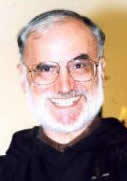What we have here is a fundamental concept of the Christian faith. The name "Messiah" in Hebrew and "Christos" in Greek mean "anointed." We ourselves, the ancient Fathers said, call ourselves Christians because we are anointed in imitation of Christ, the Anointed par excellence. In our language, the word "anointed" has many meanings and not all of them are positive. In antiquity, annointing was an important element in life. Athletes were anointed with oil so that they could be quick and agile in races and men and women were anointed with perfumed oil so that their faces were beautiful and resplendent. Today, for the same purposes, there is an infinity of products available and many of them are derived from various types of oils.
In Israel the rite had a religious significance. The kings, the priests and the prophets were anointed with perfumed oil and this was the sign that they were consecrated for divine service. In Christ all of these symbolic anointings become reality. In the baptism in the Jordan he is consecrated king, prophet and eternal priest by God the Father. This did not happen through the use of material oil but through spiritual oil, that is, through the Holy Spirit, "the oil of joy," as a Psalm says. This explains why the Church highlights so much the annointing with sacred chrism. There is a rite of annointing in baptism, in confirmation, in the ordination of priests and there is the annointing of the sick (which was once called "extreme unction"). An annointing is administered in these rites because through them we participate in the annointing of Christ, that is, the fullness of the Holy Spirit. We literally become "Christians," that is, anointed, consecrated, and people who are called, as Paul says, "to spread the sweet perfume of Christ in the world."
Let us try to see what all of this says to us men of today. Today so-called aromatherapy is very much in fashion. It uses essential oils that emit a perfume to maintain health and as therapy for certain disturbances. The Internet is full of advertising about aromatherapy. There are perfumes for physical maladies, like stress; there are also "perfumes for the soul"; one of these is supposed to help us achieve "interior peace."
It is not my place to make a judgment about this alternative medicine. However, I see that physicians discourage this practice, which is not scientifically confirmed and which in fact, in some cases, provokes counterindications. But what I would like to say is that there is a sure, infallible aromatherapy that does not provoke counterindications: that one made up of a special aroma, the perfumed ointment that is the Holy Spirit!
This aromatherapy of the Holy Spirit heals all the ills of the soul and sometimes, if God wills it, the ills of the body too. There is an African-American spiritual in which the following words are continually repeated: "There is a balm in Gilead / to make the wounded whole." (In the Old Testament Gilead was a place famous for its perfumed ointments. Cf. Jeremiah 8:22.) The song continues: "Sometimes I feel discouraged / and think my work's in vain / but then the Holy Spirit / revives my soul again." For us, Gilead is the Church and the balm that heals is the Holy Spirit. He is the scent that Jesus has left behind, passing through this world.
The Holy Spirit is a specialist in the illnesses of marriage. Marriage consists in giving oneself to another; it is the sacrament of making of oneself a gift. Now, the Holy Spirit is the gift made person; he is the giving of the Father to the Son and the Son to the Father. Where he comes there is renewed the capacity to make a gift of oneself and with this the joy and the beauty of living together.
The philosopher Heidegger made an alarmed judgment about the future of human society: "Only a god can save us," he said. I say that this God who can save us exists; it is the Holy Spirit. Our society has need of massive doses of the Holy Spirit.
[Translation by Joseph G. Trabbic]

Fr.
Raniero Cantalamessa is a Franciscan
Capuchin Catholic Priest. Born in Ascoli Piceno,
Italy, 22 July 1934, ordained priest in 1958.
Divinity Doctor and Doctor in classical literature.
In 1980 he was appointed by Pope John Paul II
Preacher to the Papal Household in which capacity he
still serves, preaching a weekly sermon in Advent
and Lent.
